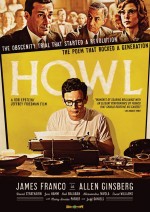Howl

Howl is composed from court records, interviews, and Allen Ginsberg‘s epic poem Howl. James Franco, as Ginsberg, reads the poem from a coffee house stage, explains it to an unseen interviewer in his dingy home, and lawyers examine and cross examine literary experts in the landmark obscenity trial.
While I’ve made my own pilgrimage to the City Lights Bookstore in San Francisco, repeatedly purchasing copies as gifts, I’ve never truly related to or identified with the material personally. But as the guise-less Franco appears in the beginning nervously reading his poem in front of the ultimate early proto-beat punk poetry audience, we begin to see the film apply the perfect-precision application of this suborbital space-age poem.
The verse is then interpreted into animated cartoons reminiscent of — and perhaps rivalled only by — Alan Parker‘s epic mixed-media classic The Wall. In fact, the main difference between the animation in The Wall and Howl is that Howl applies it to a much more useful effect. The animation in The Wall was perhaps better than the lyrics to the songs. The songs in The Wall aren’t hard to understand, but on the flip side, Howl is a dense, long work of highly stylized, wholly dated, hard-to-understand poetry. But it is rewarding, nevertheless.
Immediately after the first animated adventure, we’re dropped off in a mahogany courtroom where functional, expository scenes of the obscenity trial begin to orient the underground/subversive nature of Ginsberg’s great work. Here the filmmakers have assembled a cast of the finest of today’s stars. The poster makes it look like a huge budget movie when it is, in fact, small and intimate. The largest set piece in the film is the continued brilliance of James Franco.
In the interview scenes and poetry slam segments, Franco is the perfect choice for this film, carrying the gravity of even the greatest actors like Brando but none of the baggage that Brad Pitt or Johnny Depp would bring to a characterization of the great American beat poet. Though we may have no immediate recollection of Allen Ginsberg, we have great expectation of him via his famous name and formidable historical reputation.
So, in the beginning we arrive alone in 1950s San Francisco, listening to Franco as Ginsberg read Howl in the unnerved lyrical voice that was common in those smoky winejug-candle-lit squats, but he speaks in an American English which we do not recognize. It is unnatural. It is song and rap and gay and Jewish, and it is poetry, so it takes 85 minutes of reading and courtroom transcript re-enactment and interviews with Franco as Ginsberg and homosexual lovemaking in black and white and more poetry reading and courtroom obscenity trialing and the most brilliant use of avant-garde animation of which I am aware, but after those 85 minutes, our minds are nimbler and able to understand poetry in real time.
Howl is a great, award-worthy film of truly groundbreaking substance and composition. It’s a film of great culturally historical significance, and it’s right here in Houston at the MFAH that last weekend in December.



Leave a Reply